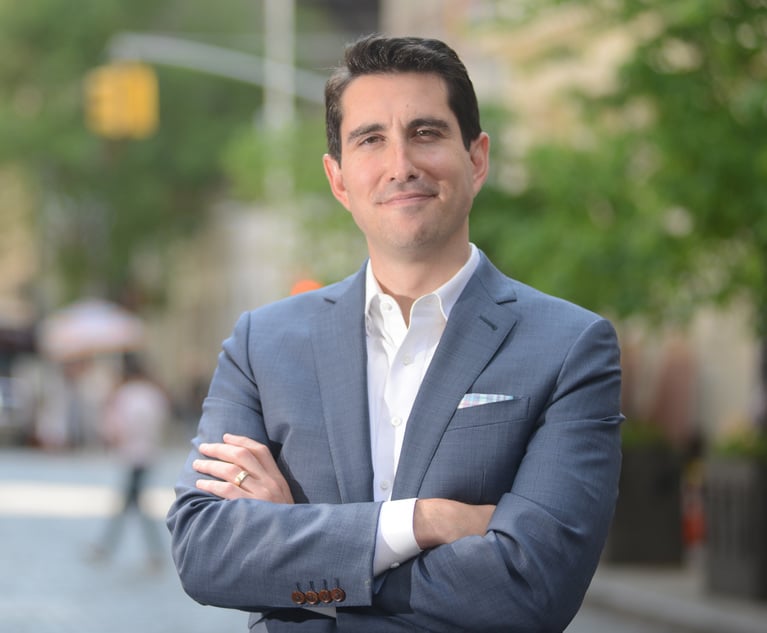Google Asks Full Federal Circuit to Decide If Servers Can Create Venue
A divided three-judge panel wrote last month that Judge Rodney Gilstrap's venue ruling can wait until after trial. Google says it's already led to a deluge of patent suits in in the Eastern District of Texas.
November 12, 2018 at 06:28 PM
3 minute read
 Neal Katyal, a partner with Hogan Lovells in Washington, D.C. Photo by Diego Radzinschi
Neal Katyal, a partner with Hogan Lovells in Washington, D.C. Photo by Diego Radzinschi
Google is asking the entire Federal Circuit to review a divided panel decision that let the company be sued for patent infringement in the Eastern District of Texas.
U.S. District Judge Rodney Gilstrap ruled in July that Google servers housed in Internet Service Providers in the district meet the “regular and established place of business” requirement of the U.S. patent venue statutes. Google and a host of tech companies complained to the Federal Circuit that Gilstrap is defying the Supreme Court's TC Heartland v. Kraft Foods Group Brands decision on patent venue and the Federal Circuit decisions applying it.
The Federal Circuit turned away Google by a 2-1 vote Oct. 29, holding that venue challenges should wait until after trial unless they pose “broad and fundamental legal questions” implicating the administration of justice. Google's case is too fact-specific to meet that standard, the court stated in a per curiam order.
➤➤ Get IP news and commentary straight to your inbox with Skilled in the Art from Law.com. Learn more.
Hogan Lovells partner Neal Katyal argues in a petition for rehearing to be filed Tuesday that Gilstrap's order is already having a broad impact. Before July, Google hadn't been sued once for patent infringement in the Eastern District of Texas, he states. After Gilstrap's order, three suits were filed. And in just the two weeks since the Federal Circuit's order, 14 more times.
“Suits against other defendants will proliferate based on the same flawed theory of venue,” Katyal writes. “Refusing to stem that tide now is not a sensible way to administer a patent system.”
The patent owner in the case, SEVEN Networks, is represented by Thompson & Knight. The servers represent “a physical, geographical location in the district from which the business of the defendant is carried out,” thereby meeting the Federal Circuit's test for venue, the company argued in previous opposition signed by partner J. Michael Heinlein.
Katyal can probably count on one vote for en banc review. Dissenting Judge Jimmie Reyna wrote that the majority—Judges Timothy Dyk and Richard Taranto—had failed to recognize “the far-reaching implications of the district court's ruling.”
Whether Google can find six more votes among the court's remaining nine members is doubtful, given that Chief Judge Sharon Prost made clear earlier this year that the court has little interest in hearing further TC Heartland-related challenges before trial.
Plus, Google appears to be running out of time. Trial is scheduled for January in SEVEN Networks v. Google.
Nevertheless, Katyal is giving it his best shot. Gilstrap's order, he writes, will “subject numerous companies to suit or the threat of suit where they have no proper place of business. It will restore the permissive venue regime that the Supreme Court, in TC Heartland, sought to rein in.” Quoting the Federal Circuit's BigCommerce decision from earlier this year, he concludes, “If ever this court's 'supervisory [and] instructional' function were essential, it is now.”
This content has been archived. It is available through our partners, LexisNexis® and Bloomberg Law.
To view this content, please continue to their sites.
Not a Lexis Subscriber?
Subscribe Now
Not a Bloomberg Law Subscriber?
Subscribe Now
NOT FOR REPRINT
© 2025 ALM Global, LLC, All Rights Reserved. Request academic re-use from www.copyright.com. All other uses, submit a request to [email protected]. For more information visit Asset & Logo Licensing.
You Might Like
View All
Crypto Entrepreneur Claims Justice Department’s Software Crackdown Violates US Constitution
4 minute read
Kraken’s Chief Legal Officer Exits, Eyes Role in Trump Administration
3 minute read
Crypto Exchange’s ‘Meteoric Rise’ Leads to Nationwide Class Action Trend
4 minute read
Trending Stories
- 1'A Death Sentence for TikTok'?: Litigators and Experts Weigh Impact of Potential Ban on Creators and Data Privacy
- 2Bribery Case Against Former Lt. Gov. Brian Benjamin Is Dropped
- 3‘Extremely Disturbing’: AI Firms Face Class Action by ‘Taskers’ Exposed to Traumatic Content
- 4State Appeals Court Revives BraunHagey Lawsuit Alleging $4.2M Unlawful Wire to China
- 5Invoking Trump, AG Bonta Reminds Lawyers of Duties to Noncitizens in Plea Dealing
Who Got The Work
J. Brugh Lower of Gibbons has entered an appearance for industrial equipment supplier Devco Corporation in a pending trademark infringement lawsuit. The suit, accusing the defendant of selling knock-off Graco products, was filed Dec. 18 in New Jersey District Court by Rivkin Radler on behalf of Graco Inc. and Graco Minnesota. The case, assigned to U.S. District Judge Zahid N. Quraishi, is 3:24-cv-11294, Graco Inc. et al v. Devco Corporation.
Who Got The Work
Rebecca Maller-Stein and Kent A. Yalowitz of Arnold & Porter Kaye Scholer have entered their appearances for Hanaco Venture Capital and its executives, Lior Prosor and David Frankel, in a pending securities lawsuit. The action, filed on Dec. 24 in New York Southern District Court by Zell, Aron & Co. on behalf of Goldeneye Advisors, accuses the defendants of negligently and fraudulently managing the plaintiff's $1 million investment. The case, assigned to U.S. District Judge Vernon S. Broderick, is 1:24-cv-09918, Goldeneye Advisors, LLC v. Hanaco Venture Capital, Ltd. et al.
Who Got The Work
Attorneys from A&O Shearman has stepped in as defense counsel for Toronto-Dominion Bank and other defendants in a pending securities class action. The suit, filed Dec. 11 in New York Southern District Court by Bleichmar Fonti & Auld, accuses the defendants of concealing the bank's 'pervasive' deficiencies in regards to its compliance with the Bank Secrecy Act and the quality of its anti-money laundering controls. The case, assigned to U.S. District Judge Arun Subramanian, is 1:24-cv-09445, Gonzalez v. The Toronto-Dominion Bank et al.
Who Got The Work
Crown Castle International, a Pennsylvania company providing shared communications infrastructure, has turned to Luke D. Wolf of Gordon Rees Scully Mansukhani to fend off a pending breach-of-contract lawsuit. The court action, filed Nov. 25 in Michigan Eastern District Court by Hooper Hathaway PC on behalf of The Town Residences LLC, accuses Crown Castle of failing to transfer approximately $30,000 in utility payments from T-Mobile in breach of a roof-top lease and assignment agreement. The case, assigned to U.S. District Judge Susan K. Declercq, is 2:24-cv-13131, The Town Residences LLC v. T-Mobile US, Inc. et al.
Who Got The Work
Wilfred P. Coronato and Daniel M. Schwartz of McCarter & English have stepped in as defense counsel to Electrolux Home Products Inc. in a pending product liability lawsuit. The court action, filed Nov. 26 in New York Eastern District Court by Poulos Lopiccolo PC and Nagel Rice LLP on behalf of David Stern, alleges that the defendant's refrigerators’ drawers and shelving repeatedly break and fall apart within months after purchase. The case, assigned to U.S. District Judge Joan M. Azrack, is 2:24-cv-08204, Stern v. Electrolux Home Products, Inc.
Featured Firms
Law Offices of Gary Martin Hays & Associates, P.C.
(470) 294-1674
Law Offices of Mark E. Salomone
(857) 444-6468
Smith & Hassler
(713) 739-1250










